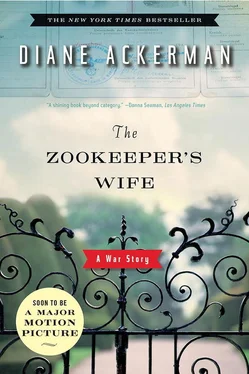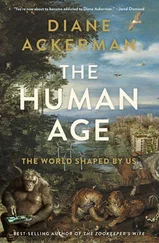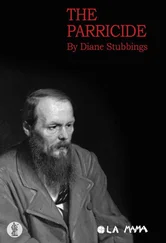This ideal of racial purity really bloomed with Konrad Lorenz, a Nobel scientist highly respected in Nazi circles, who shared Oswald Spengler’s belief popularized in The Decline of the West (1920) that cultures inevitably decay—but not Spengler’s pessimism. Instead he turned to the domestication of animals as an example of how cultures decline, through haphazard breeding of robust and humdrum stock, and championed a biological solution: racial hygienics, a “deliberate, scientifically founded race policy” [20] Konrad Lorenz quoted in Ute Deichmann, Biologists Under Hitler , trans. Thomas Dunlap (Cambridge, Mass.: Harvard University Press, 1996), p. 187.
in which ruin is prevented by the elimination of “degenerate” types. Lorenz used the terms species, race, and Volk interchangeably and warned that “the healthy volkish body often does not ‘notice’ how it is being pervaded by elements of decay.” [21] Konrad Lorenz, “Durch Domestikation verursachte Störungen artewigen Verhaltens,” Zeitschrift für angewandte Psychologie und Charaklerunde , vol. 59 (1940), p. 69.
Describing that decay as the cancer of a physically ugly people and arguing that each animal’s goal is the survival of its species, he invoked an ethical commandment he claimed the Bible supported—“Thou shalt love the future of your Volk above all else”—and called for dividing people between those of “full value” and those of “inferior value” (which included whole races and anyone born with mental or physical disabilities), purging the feeble, both in humans and animals.
Heck agreed, aspiring to nothing less than recasting Germany’s natural world, cleansing it, polishing it, perfecting it. A true believer from the first stirrings of Nazism, Heck ingratiated himself with the SS, imbibed Fischer’s and Lorenz’s beliefs about racial purity, and became a favorite with Hitler and, especially, Hermann Göring, his ideal patron. [22] As part of Hitler’s inner circle, he quickly rose to “air minister,” as well as “Master of the German Hunt” and “Master of German Forests.” More than just an avid huntsman—he once had a stag from his estate flown to him in France so that he could track and shoot it—Göring identified hunting with life at his boyhood castle, and dreamt of returning Germany to its lost greatness (“Our time will come again!” he would proclaim). Weekends he spent in the forests, and seizing any excuse to combine politics and hunting, he hosted haute cuisine shooting parties. Hitler didn’t hunt, though he often wore hunter’s garb, especially at his lodge in the Alps, as if at any moment he might release a falcon or leap into the saddle and chase a candelabra-horned stag. Fascinated by boar hunting, Göring prized a custom-made fifty-inch boar spear with a leaf-shaped blade of blue steel, a dark mahogany grip, and a steel shaft with two hollow pleated spheres that rattled to scare his prey from the underbrush. Göring took dozens of hunting trips with friends, foreign dignitaries, and members of the German high command from the mid-1930s to late 1943; and documents show that even in January and February of 1943, while Germany was losing on the Russian front, Göring was at his castle, hunting Rominten wild boar and Prussian royal stags. (During this same period he also introduced ballroom dancing lessons for Luftwaffe officers.)
In this sanitary utopia, Heck’s job, essentially, was to reinvent nature, and he found Göring a generous patron with deep pockets. In return, Heck wanted to give Göring dominion over Poland’s greatest natural treasure, the fantastic lost-in-time preserve on the Polish-Belarussian border, Białowieża. As Heck appreciated, it made the ultimate gift for a man who stamped his coat of arms on most possessions and liked to dress in “pseudo-medieval outfits of long leather jerkins, soft top boots, and voluminous silk shirts, and go marching around his house and estate carrying a spear.” Many aristocrats held key positions in the Nazi Party and most of the high command owned hunting lodges or estates, so an important facet of Heck’s job was bagging the best hunting preserves and stocking them in novel ways. Dotted with medieval castles, inheritor of Europe’s only primeval forest, Poland boasted some of the finest hunting on the continent. Prewar photographs place Göring at his sumptuously appointed hunting lodge northeast of Berlin, on an estate stretching to the Baltic, complete with a 16,000-acre private preserve which he stocked with elk, deer, wild boar, antelope, and other game animals.
More broadly, the Nazis were ardent animal lovers and environmentalists who promoted calisthenics and healthy living, regular trips into the countryside, and far-reaching animal rights policies as they rose to power. Göring took pride in sponsoring wildlife sanctuaries (“green lungs”) as both recreation and conservation areas, and carving out great highways flanked by scenic vistas. That appealed to Lutz Heck as it did to many other world-class scientists, such as physicist Werner Heisenberg, biologist Karl von Frisch, and rocket designer Wernher von Braun. Under the Third Reich, animals became noble, mythic, almost angelic—including humans, of course, but not Slavs, Gypsies, Catholics, or Jews. Although Mengele’s subjects could be operated on without any painkillers at all, a remarkable example of Nazi zoophilia is that a leading biologist was once punished for not giving worms enough anesthesia during an experiment.
WITH BLACKOUT IN EFFECT AND MOST OF THE ANIMALS GONE, dawn no longer announced itself by spilling light into the bedroom and unleashing the zoo’s otherworldly chorale. One awoke in darkness and silence, the bedroom windows sealed with plywood and most of the animal calls either missing or muffled. In a quiet that dense, body sounds become audible, one hears blood surging and the bellows of the lungs. In a darkness that deep, fireflies dance across eyes that see into themselves. If Jan were dressing beside the terrace door, Antonina wouldn’t have spotted him. If she reached a hand over to the other side of the bed, patted around the pillow, and found it empty, she might have been tempted to loll with memories of zoo life before the war, lost in the dreamy lucidity of her children’s books. But on this day, Antonina needed to get busy with her chores, since there were still some animals left to feed, Ryś to dress for school, and the house to prepare for Heck’s visit.
Antonina noted that she found Heck “a true German romantic,” naïve in his political views and conceited perhaps, but courtly and impressive. She was flattered by his attention, and learned from a mutual friend that she reminded him of his first great love, or so he swore. Their paths rarely crossed, but she and Jan did visit the Berlin Zoo now and then, and Heck had sent them photographs taken on expeditions with cordial letters in which he praised their work.
Antonina slipped into one of several polka-dot dresses she fancied for social occasions (some had a lace or ruffled collar). Photographs almost always show her covered in small lynx-like spots or large pale polka dots against a black or navy blue background that set off her light hair.
From the porch, Jan and Antonina could see Heck’s car pass through the main gate—and they no doubt mustered smiles by the time he pulled up.
“Hello, my friends!” Heck said, climbing out. A tall, muscular man with hair combed back and a dark, neatly kept mustache, Heck now wore the uniform of a Nazi officer and the effect was jarring, even if expected, since they were used to seeing him in civilian, zoo, or hunting clothes.
He and Jan shook hands warmly, and he cupped Antonina’s hand and kissed it. One can be certain of that, since it was the custom, but not how this “true German romantic” might have kissed it. Casually or with a flourish? Lips touching the skin or hovering a breath away? As with a handshake, a hand kiss may reflect subtle feelings—a salute to femininity, a quaking heart, a grudging obedience, a split second of crypto-devotion.
Читать дальше












